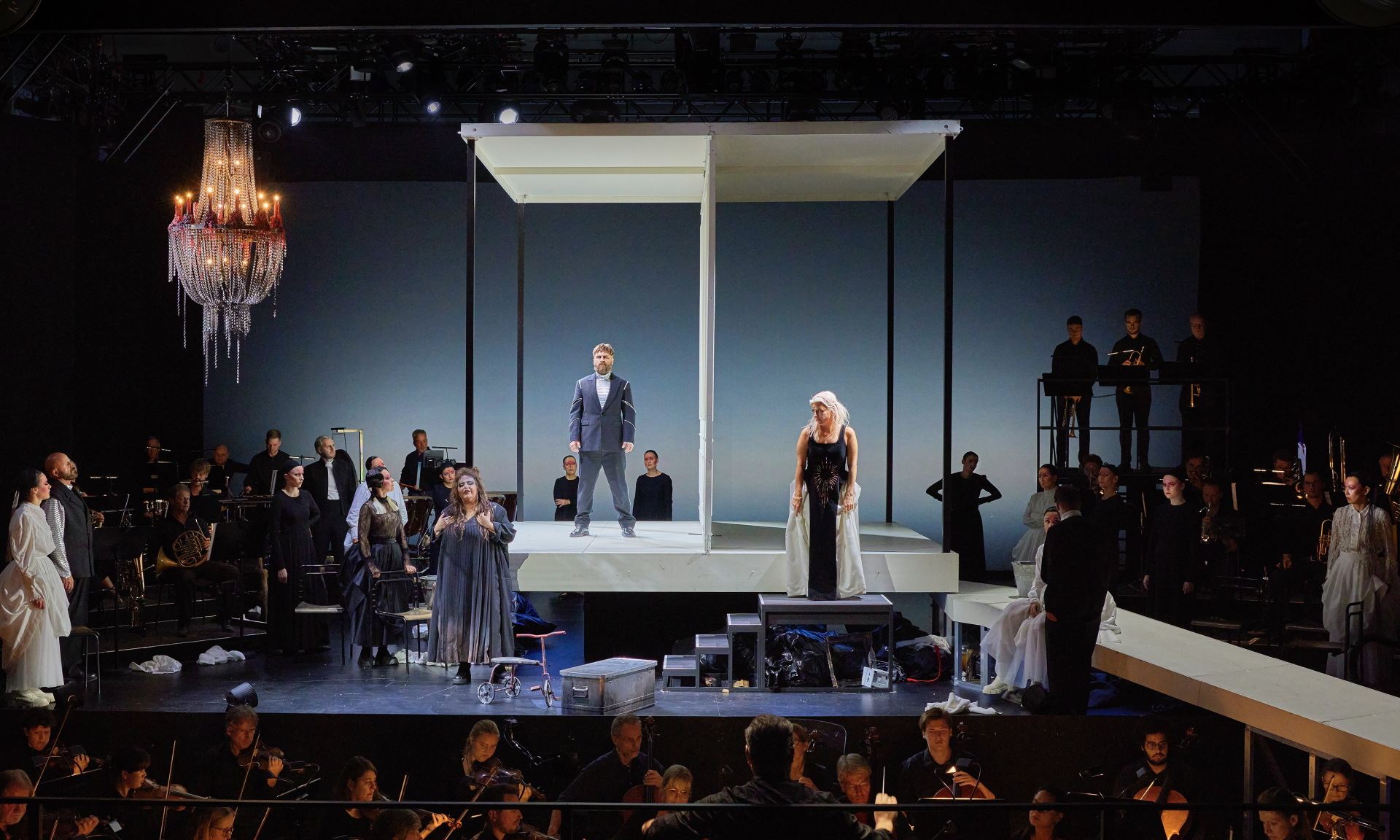Elektra.
One-act opera by Richard Strauss.
Mainfranken Theater Würzburg 2023/2024
Musical director Enrico Calesso
Stage director Nina Russi
Set and costume design Julia Katahrina Berndt
Light design Andreas Schmidt
Dramaturgy Berthold Warnecke
Elektra Elena Batoukova-Kerl
Klytämnestra Sanja Anastastia
Chrysothemis Ilia Papandreou
Aegisth Brad Cooper
Orest Kosma Ranuer
Der Pfleger des Orest Herbert Brand
Die Vertraute / Die Aufseherin Natalia Boldyrieva
Die Schleppträgerin / Vierte Magd Milena Arsovska
Ein junger Diener Mathew Habib
Ein alter Diener Gustavo Müller
Erste Magd Barbara Schöller
Zweite Magd Veronica Brandhofer
Dritte Magd Hiroe Ito
Fünfte Magd Sandra Harnisch
Philharmonisches Orchester Würzburg
Statisterie Mainfranken Theater Würzburg
Premiere 08 October 2023
Photos © Nik Schölzel
Video recording available on request
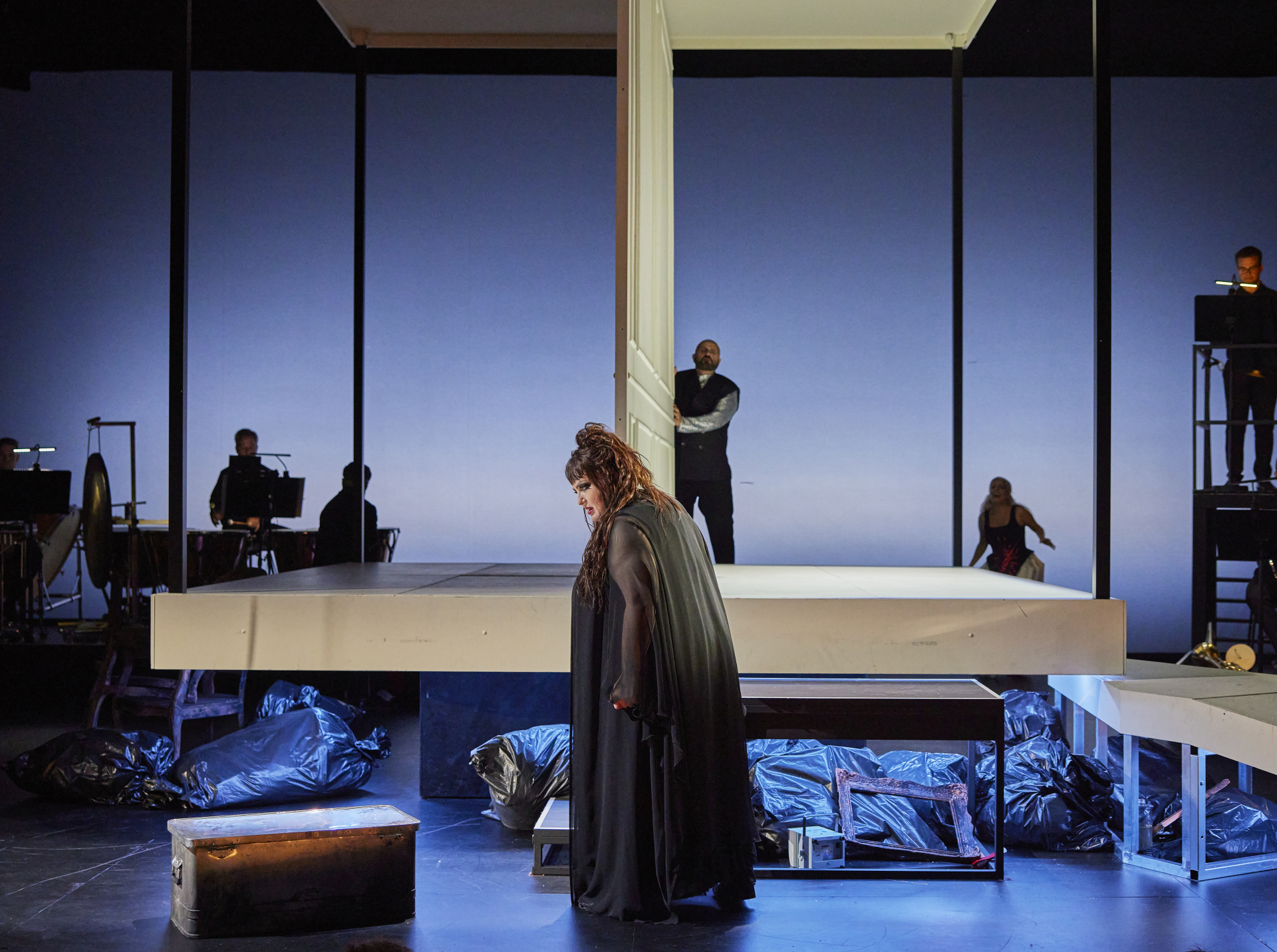


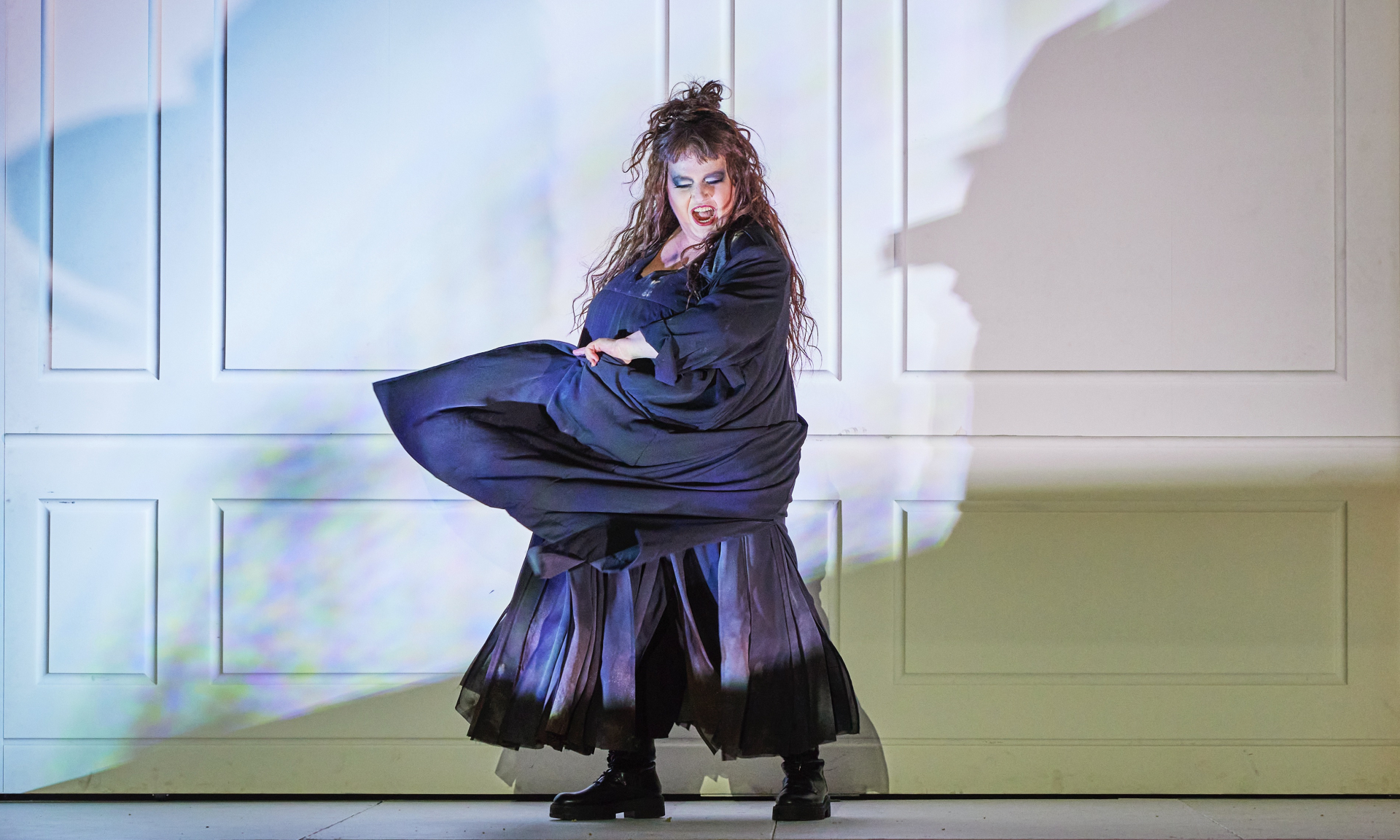

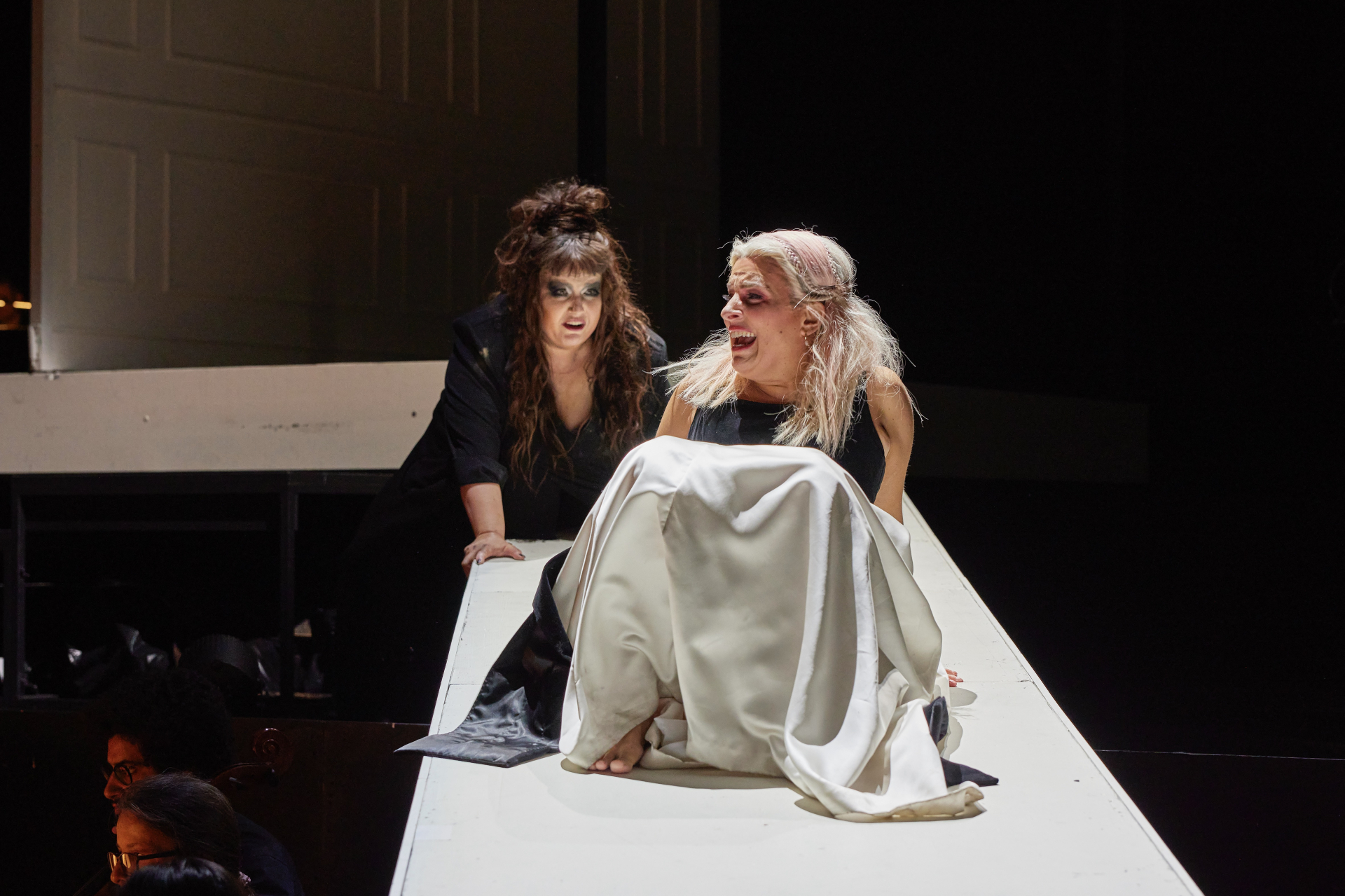
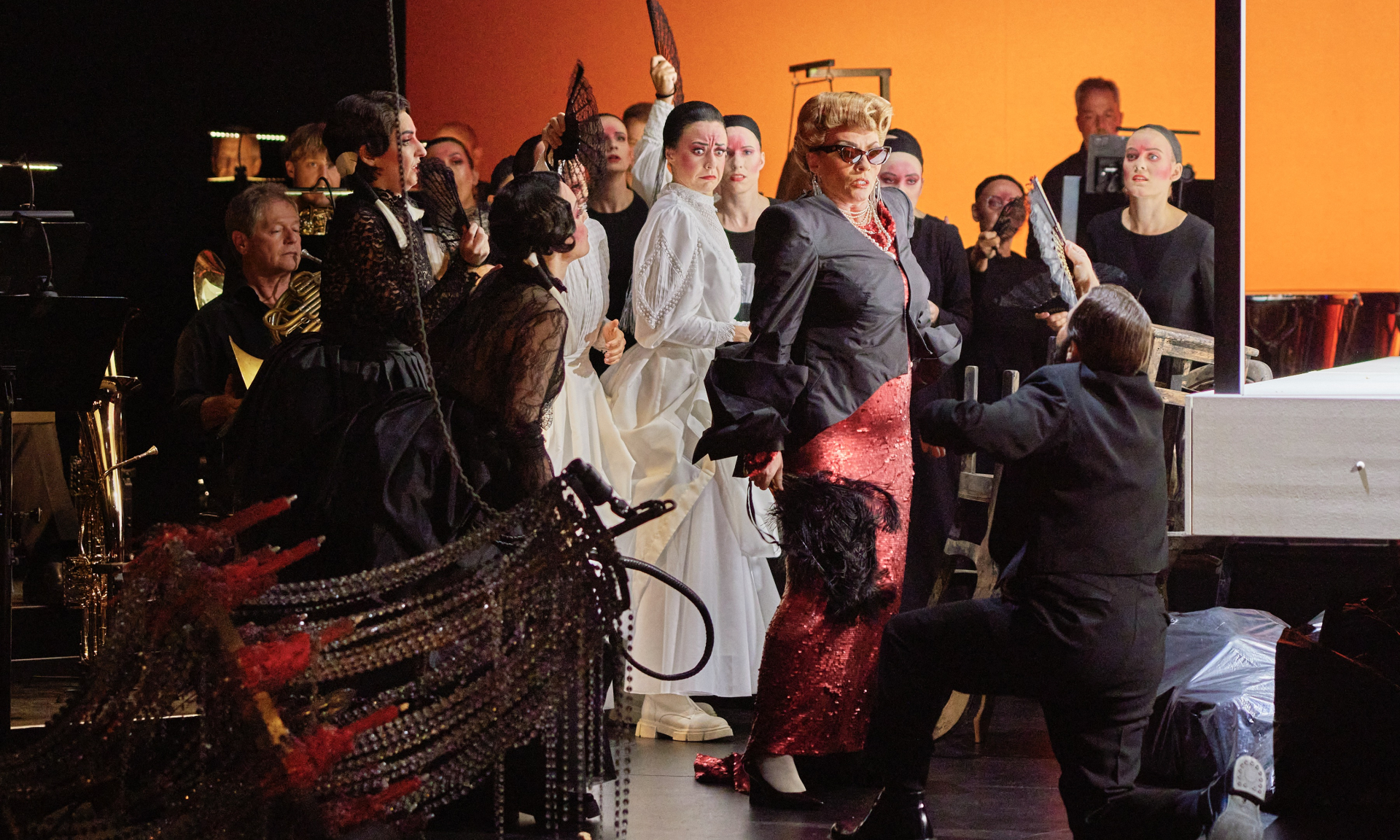

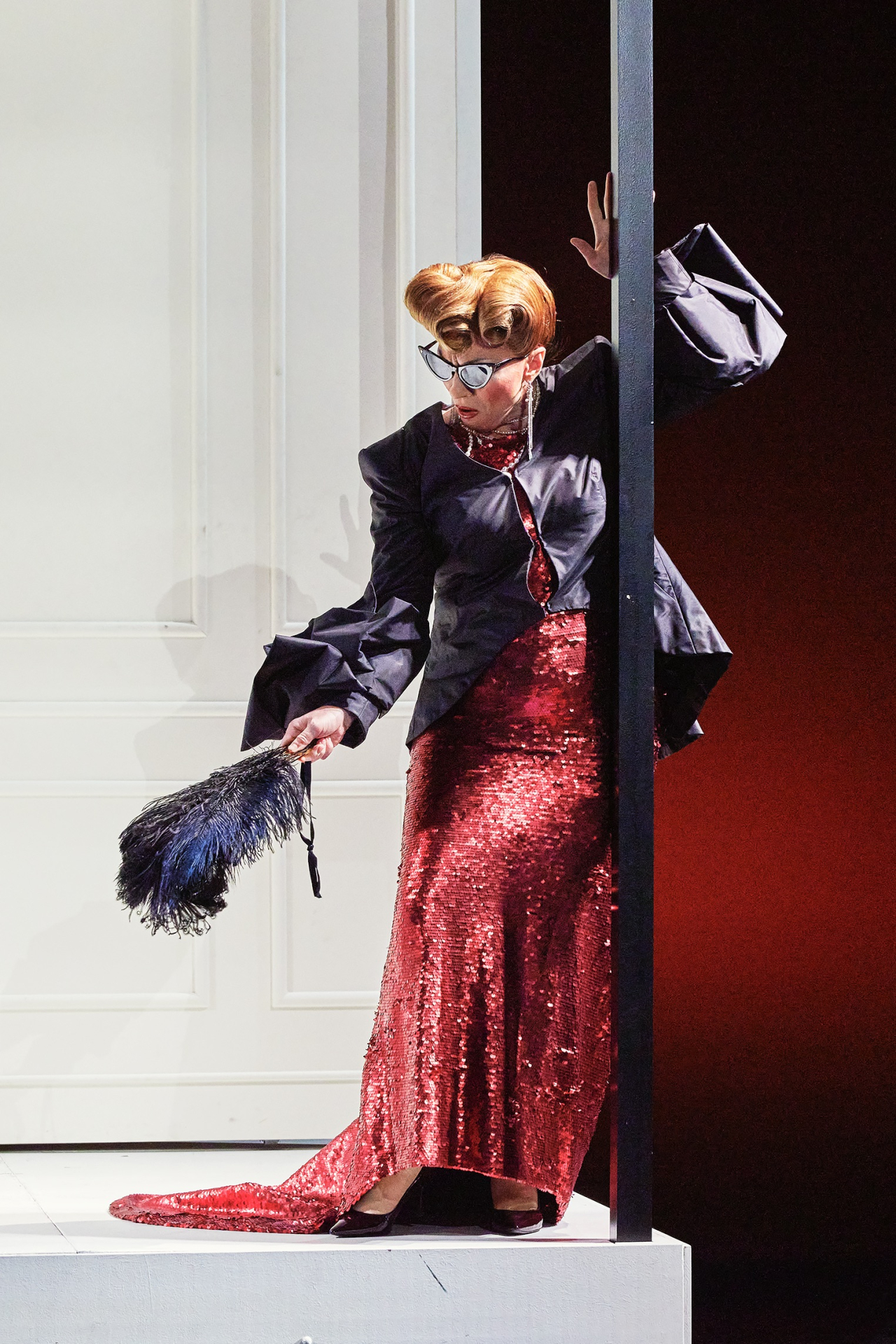
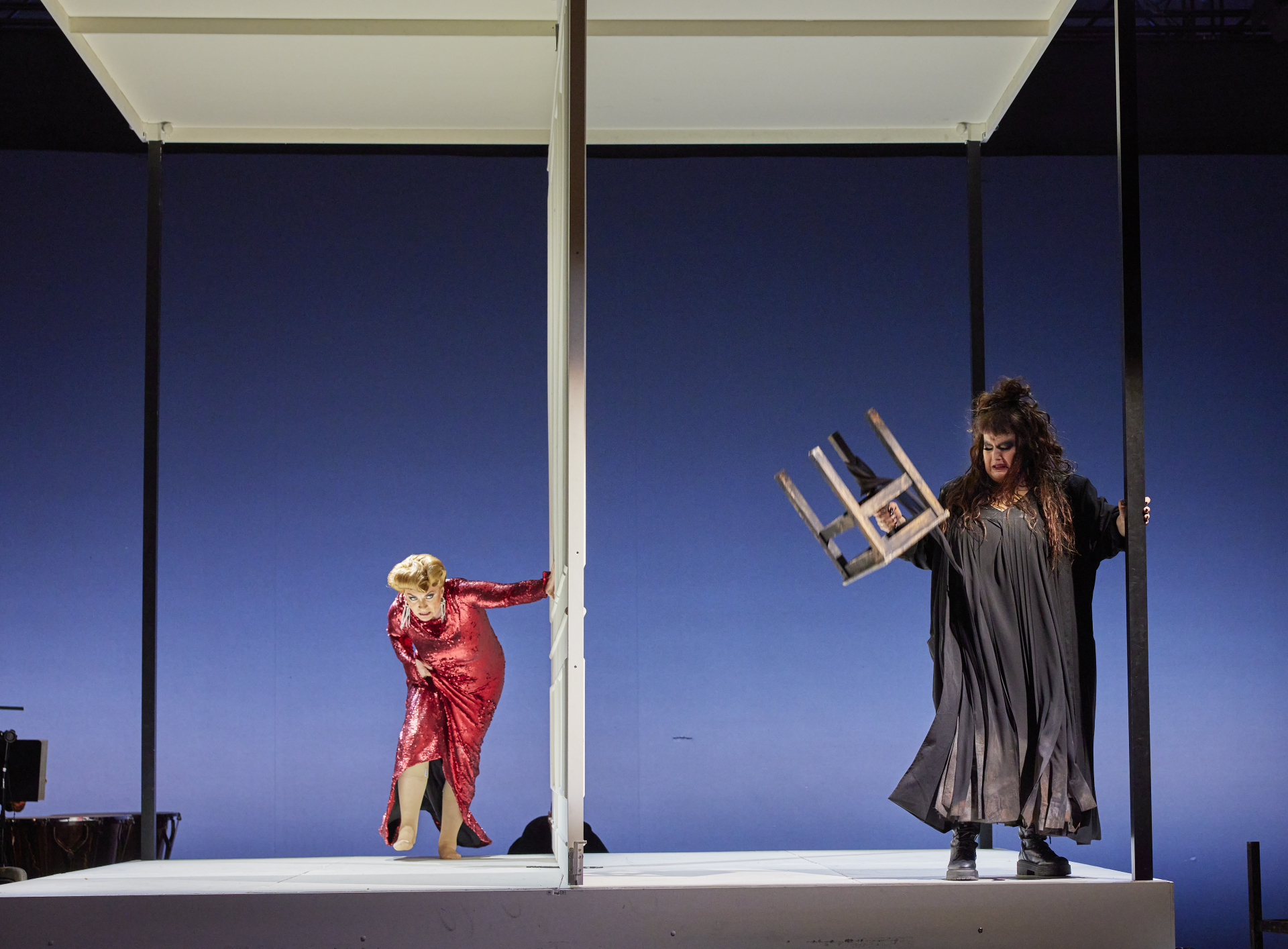
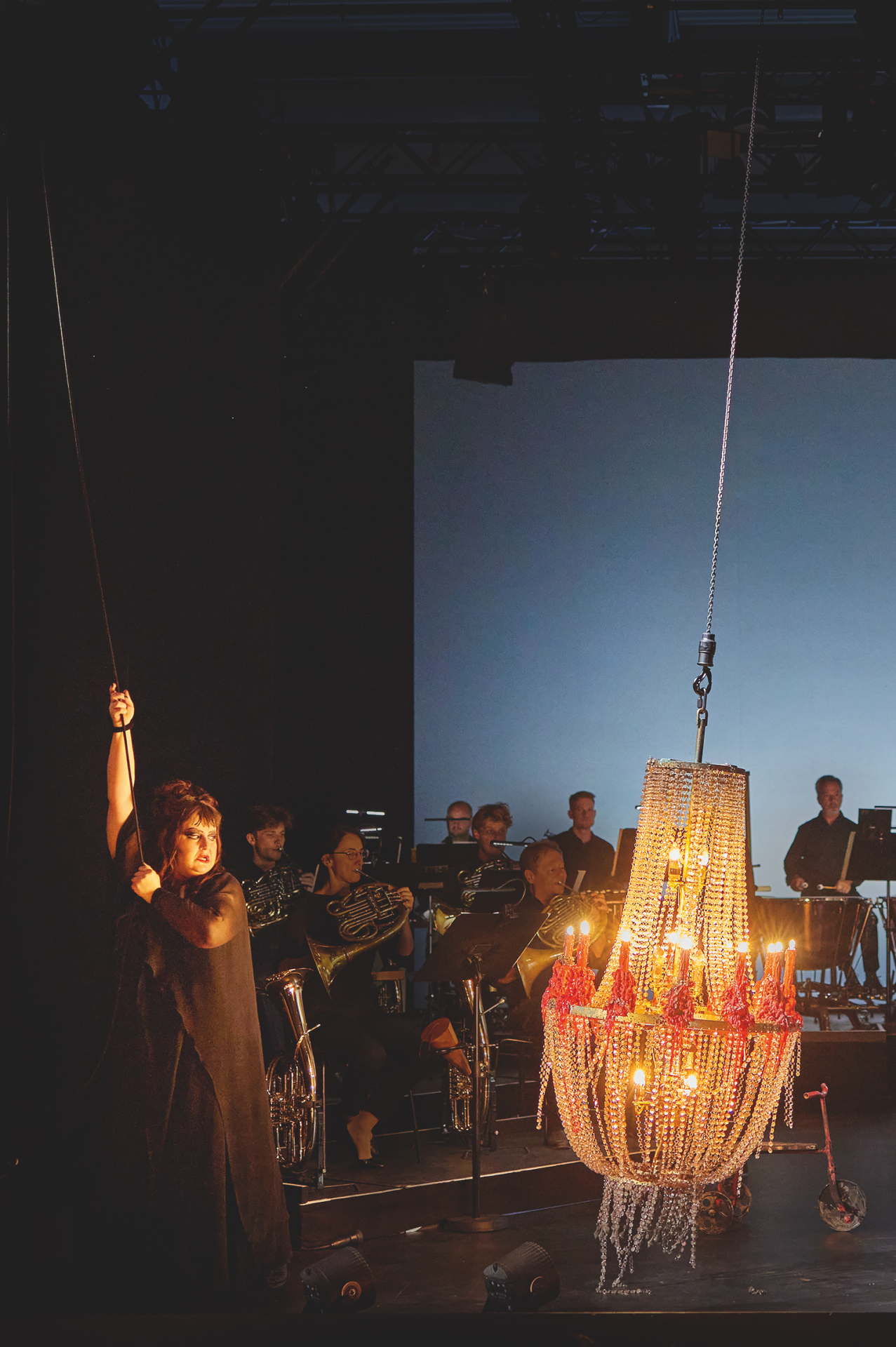

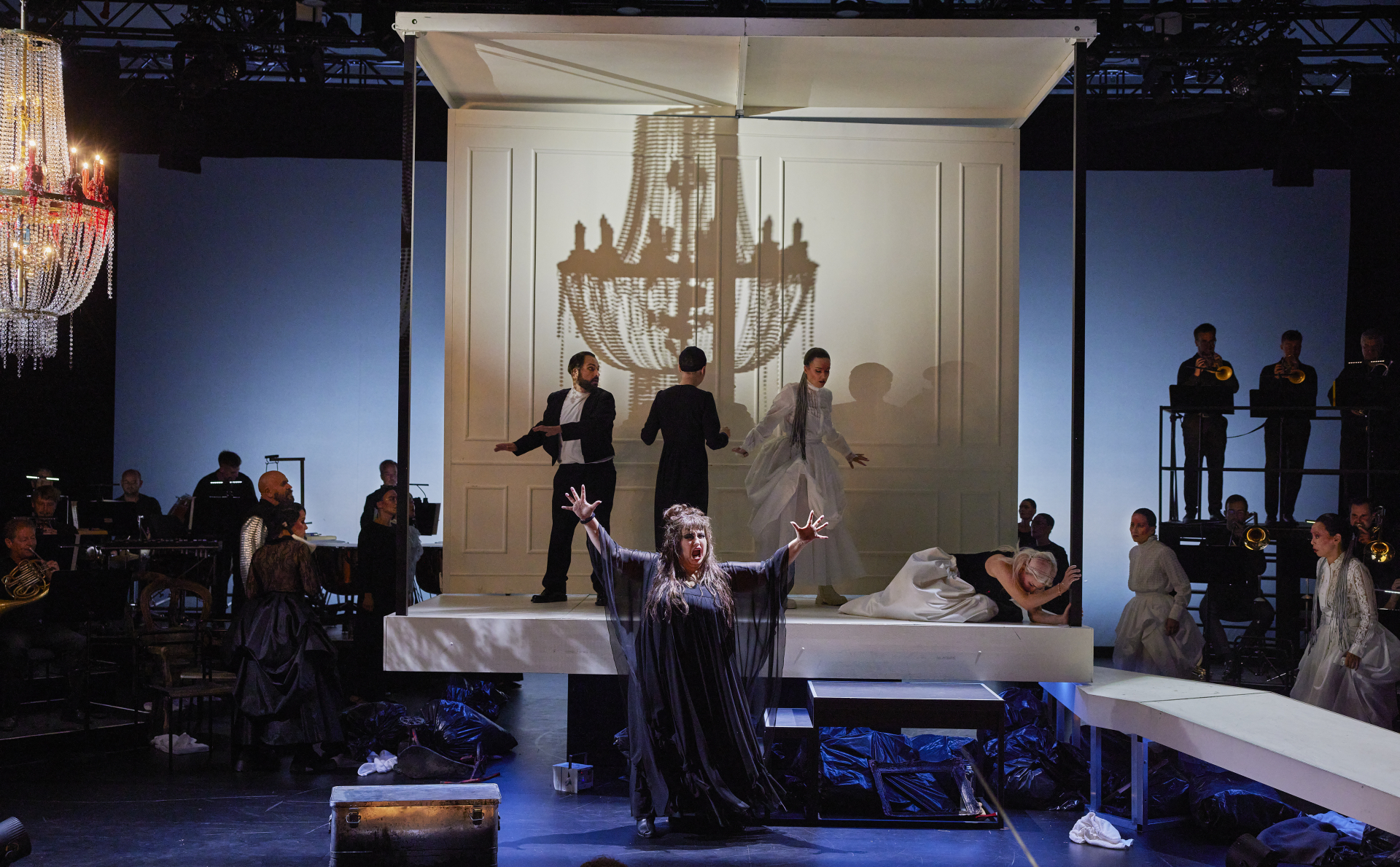
Press reviews
In the revolving door of horror
Watching a soul suffer is anything but appetising. However, it can be deeply moving when it is staged in the way that Swiss-Austrian director Nina Russi did at the Mainfrankentheater in Würzburg. [...] Standing ovations for a Richard Strauss evening that was stirring in every respect: the dark (and vociferous) revenge drama about a murderous royal family was convincing in Würzburg with its visually powerful direction and sparkling conducting.
BR Klassik, Peter Jungblut
An opera event that overwhelms
The Mainfranken Theatre's production in the Blaue Halle is extremely impressive: a large orchestra, great voices, gripping direction and a magnificent stage design. [...] Nina Russi portrays the characters precisely and authentically. And thus rejects some role clichés.’
Main-Post, Mathias Wiedemann
The angry woman and her weapon
Miracles are also possible here. Richard Strauss' “Elektra”, for example, achieves a rare power and penetration. That was not to be expected. Director Nina Russi and conductor Enrico Calesso achieve this with so-called manageable resources, sense, understanding and presumably a lot of affection. [...] Russi's reading is compact and plausible; she needs neither blood nor other garishness to give the total permanent excitement of the situation and music appropriate images. Here, people simply move - crawling, strutting, scurrying, always staring - in a nightmare that they have long known and yet cannot face calmly.
Frankfurter Rundschau, Judith von Sternburg
Trapped in a world of revenge
The audience is also caught up in an oppressive plot directed by Nina Russi, which is almost impossible to escape in all its cruelty and absoluteness. [...] Standing ovations for a blood drama that is as dark as it is visually and sonically powerful. There were prophecies of doom that an ‘Elektra’ would not be possible in the temporary ‘Blue Hall’. Enrico Calesso's Würzburg Philharmonic Orchestra, the singers and Nina Russi's directing team successfully defied them.
Main Echo, Michaela Schneider
Extreme hatred
Despite its harshness and dissonance, this actually disturbing work fascinates through the density of its statements. Nina Russi's direction reinforces the stirring effect by concentrating on a few means [...] like a reduced chamber play. [...] For all the cruelty of the content, the production lives from the convincing portrayal of the characters [...]. The premiere audience in the almost sold-out theatre celebrated the gripping opera production for a long time with enthusiastic applause and many shouts of bravo.
Culture magazine O-Ton, Renate Freyeisen
With enormous force
In the subtle direction of Nina Russi, the opera ‘Elektra’ by Richard Strauss (...) gains new intensity. [...] The scene between Elektra and Klytämnestra can hardly be surpassed in terms of dramatic impact. [...] The stage becomes a no man's land and a battle arena. [...] The action is explosive right to the end. Ovations and cheers [...] for the entire team.
Online Merker & Theatre Compass, Alexander Walther
Dance into death
The gripping effect is heightened by Nina Russi's skilful direction of the characters in combination with the set and costume design by Julia-Katharina Berndt: it is a concentration on a few decisive elements, as in a chamber play. The black and white contrast dominates, complemented by the blood colour red.
Bayerische Staatszeitung, Renate Freyeisen
A great moment for traumatised women
Nina Russi modelled precisely drawn characters who hate each other and still can't get away from each other, without blood, cringing and yet with expressive density. [...] The young Swiss director's staging had the format, style and character for Hugo von Hofmannsthal's precise study of the traumatised trio of women under the scourge of the Atrid curse. This was performed in Würzburg without any nerdy excesses. On the contrary. Russi gave serious and even elegant contours to Elektra, who lives only for her thoughts of revenge and the memory of her murdered father Agamemnon, her sister Chrysothemis, who longs for healthy sex and healthy children, and her psychosomatically tormented mother Klytämnestra.
Neue Musikzeitung, Roland H. Dippel

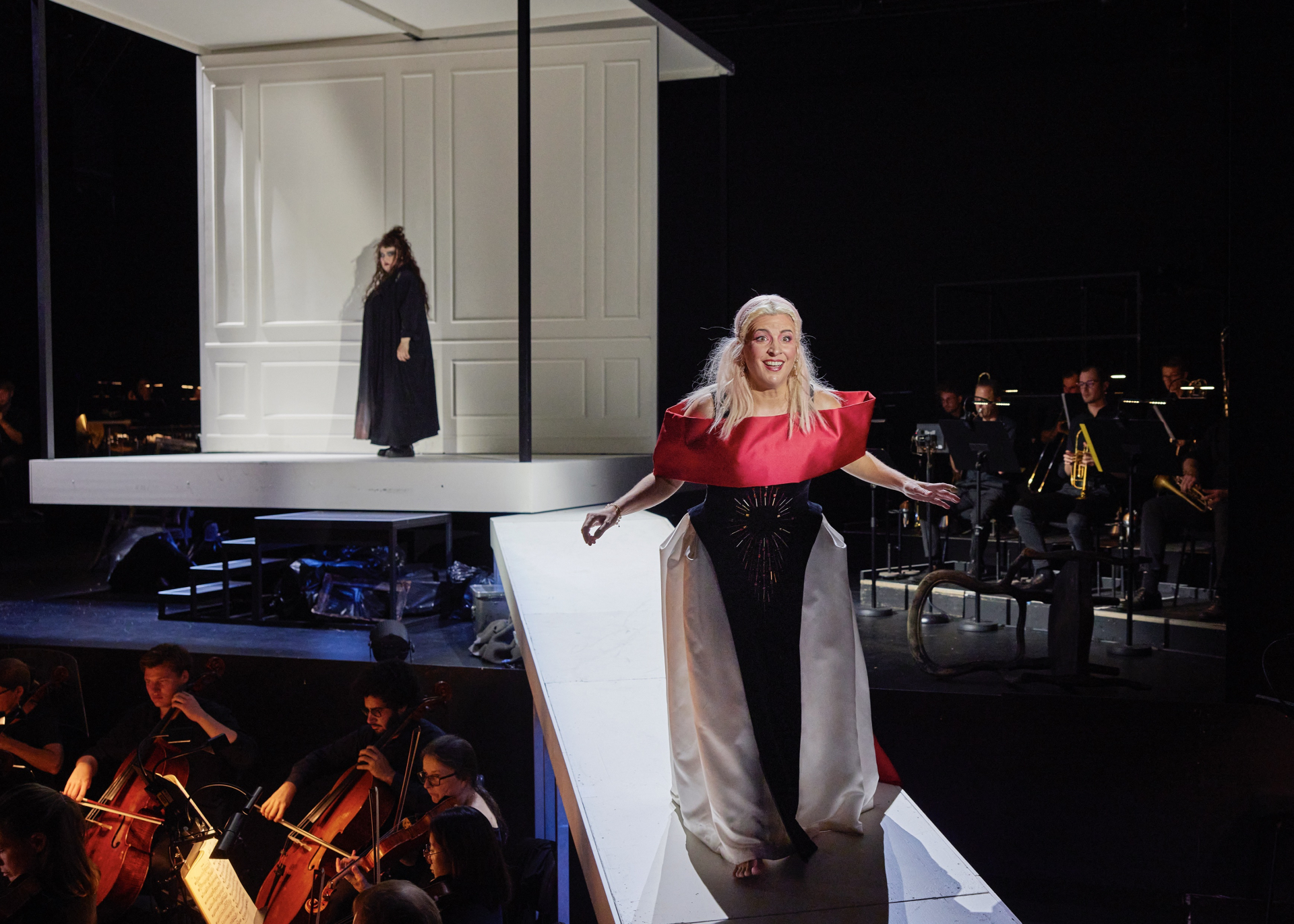
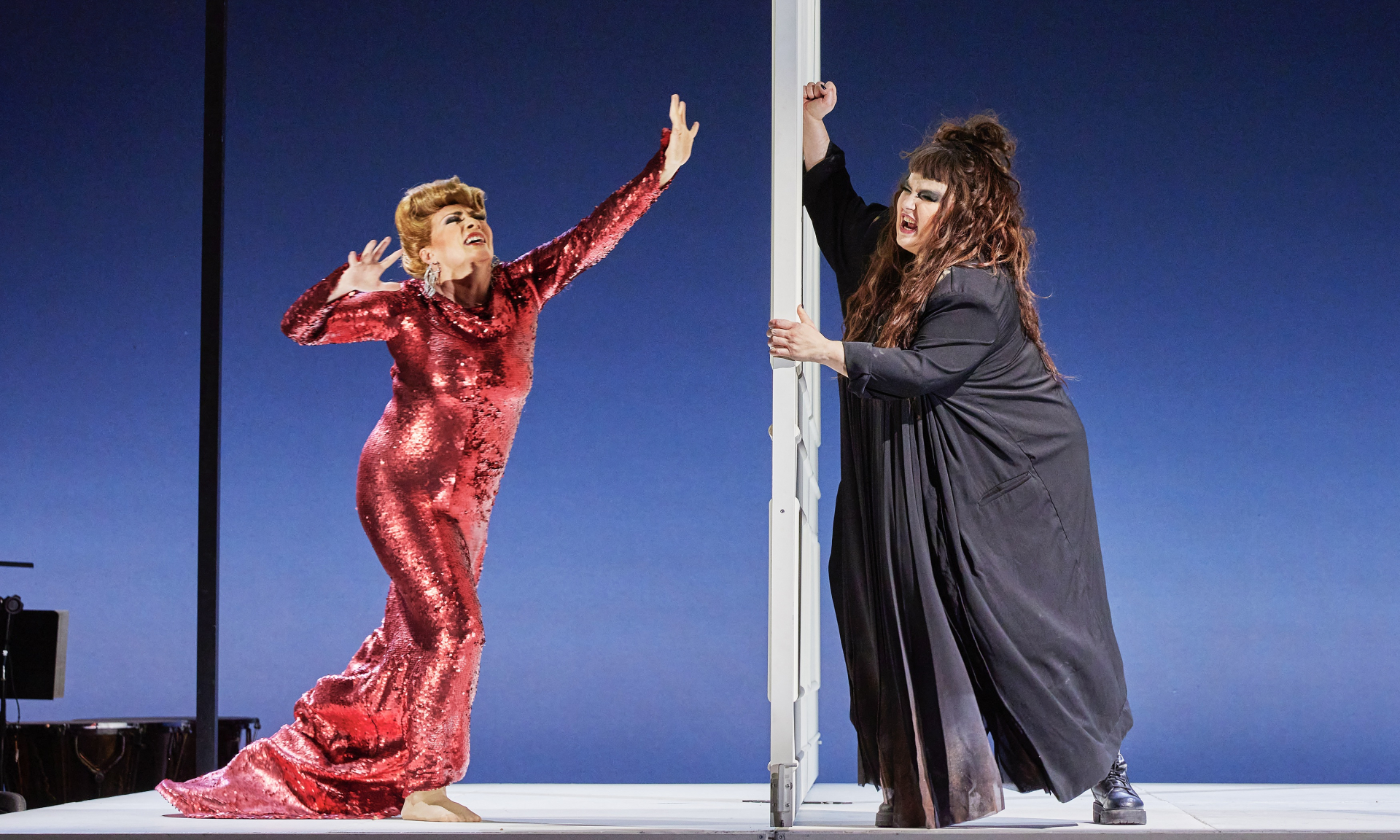

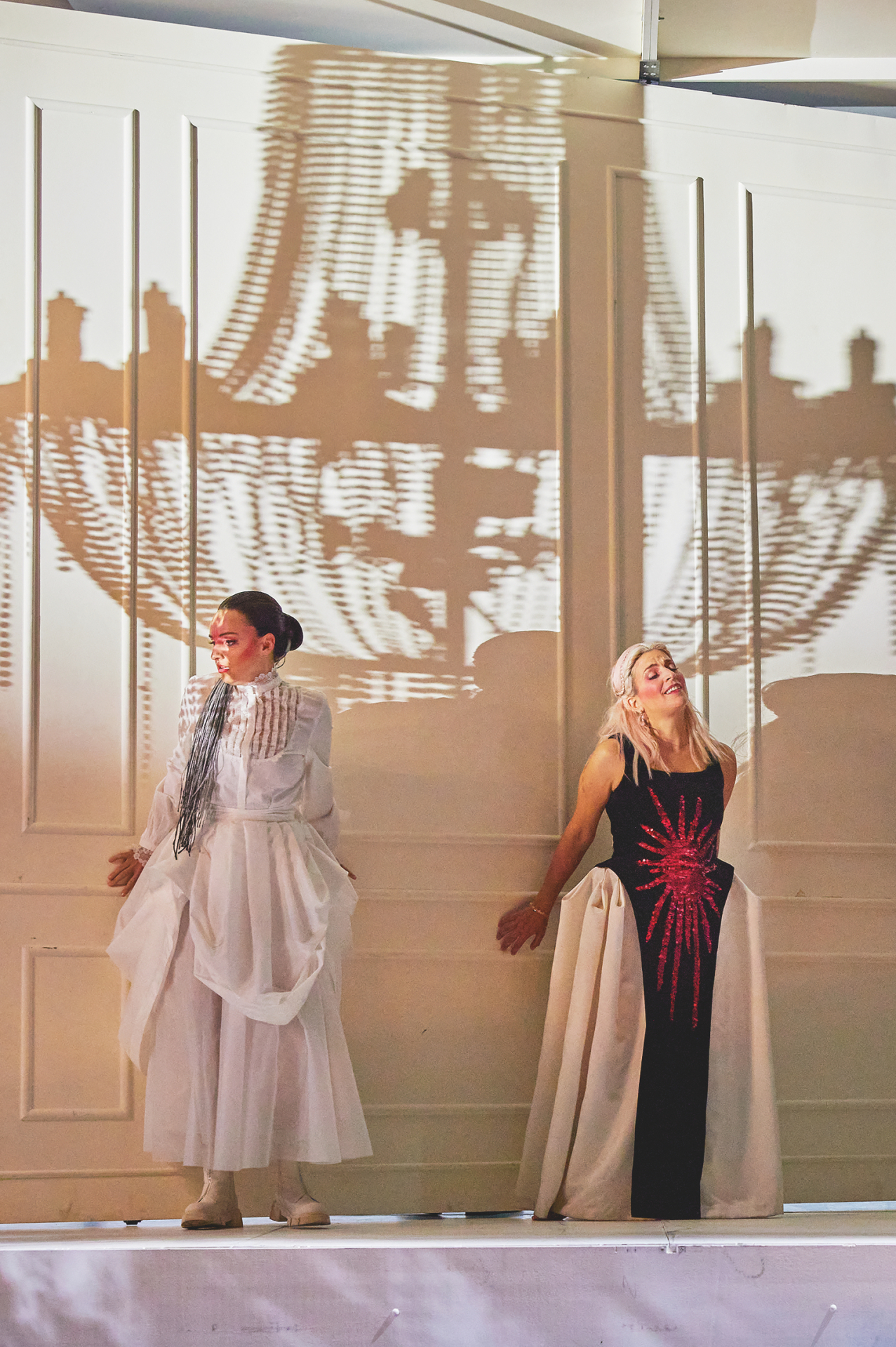
Splinters of thought. Elektra fascinates as a woman and as a play. A violent family tragedy with murder, retribution and revenge. A psychological drama of feelings, desires and nightmares. The psychogram of a woman, three women, a family. It is as if a human soul is compressed in an expanding moment, time seems to stand still.
It doesn't matter where, whether Greek or contemporary, what is important is what is being negotiated. We meet three women with different life plans and basic situations. As if under a magnifying glass, we observe how the three deal with their muddled situation and constellation. Father Agamemnon is dead, murdered by his own wife and her lover. Daughter Elektra struggles with the loss of her father, is an outsider at court and has hysterical delusions. She leads a powerless life in the ruins of Greece's history and her family, fuelled only by the thought of revenge. Her sister Chrysothemis represses the past and hopes for a new life with her husband and child. The antagonist is their mother, Clytemnestra, a woman on the verge of madness with terrible mental pain that also becomes physical. But self-alienation and loss of identity are common to all three. This gives rise to numerous moments in which mother and daughter, as well as the two sisters, are emotionally closer than they would like.
Elektra waits for her returning brother to carry out the act of revenge, the murder of her mother. In this gloomy atmosphere, Elektra, hateful and self-destructive, rescues herself by believing in a ritual, in the daily evocation of the murdered father at the hour of death. It must feel like a bleeding or festering wound, a tear through the soul. Her feelings and thoughts go round in circles, she is caught in a vicious circle, in a whirlpool, in a world that revolves in ever smaller circles around dishonour and revenge. There is waiting, listening, lurking, searching, digging, moaning, screaming, hoping, loving and murdering.
The expressive instrumental interludes - space and time for pure emotional outbursts - conden the scenes to the highest suggestive power, in which gestures and light say more than language and the music can unfold its extraordinary effect. Beauty emerges from horror, or even more: sensuality.
Thus Elektra meets her doom and inevitable end, and after the murder of Clytemnestra and her lover Aegisth, which her brother Orest finally accomplishes, the past and future lose all meaning. Elektra's last words are: ‘Silence and dancing’. We then witness how Elektra's complete exhaustion, lust and rage culminate in an ecstatic, even orgiastic outburst, like an earthquake. The apotheosis is a ‘dance of triumph’ that symbolises complete isolation. The production ends with the image of an apocalyptic atmosphere.
At its core, the play shows a fascinating and repulsive, yet timeless truth in that the children attempt to break through the logic of their parents' hypocrisy and self-deception - by committing a crime. By avenging the guilt of their ancestors, the descendants become guilty again. The victims become perpetrators. The generational conflict ends so cruelly that the question arises as to whether a new beginning is even possible for the children in this destroyed world. Will Elektra stay? Will she leave this system or will it break her?
Statement by director Nina Russi in the programme booklet
